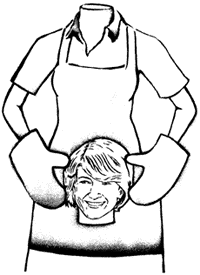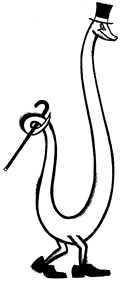News from academe.
Compiled by the editors of LinguaFranca
(posted Saturday, Sept. 13)
Holy War
A group of scholars known as "biblical minimalists" is claiming that the Good Book is thoroughly worthless as a historical document, and that all future efforts to reconstruct the early history of Israel must rely strictly on archaeology. In a recent discussion of the subject in Bible Review, leading British scholar Philip Davies is quoted as saying that "the figure of King David is about as real as [that of] King Arthur," and minimalists point out that the archaeological evidence for David's existence amounts to a solitary reference to the "House of David" on a victory monument at Tel Dan. Similarly, Andrews University's David Merling says that "only those who are friendly to the biblical story would actually believe in an Exodus event." Discarding the biblical narrative, minimalists reinterpret the flight from Egypt into Israel as a variety of indigenous peasant revolt in which fed-up Canaanite farmers wrested their land from feudal lords. Traditional scholars respond that, while the Bible may have a shaky sense of chronology, to dismiss the text entirely is irresponsible.

Deconstructing Martha
Cultural studies scholars are assembling an anthology tentatively titled The Martha Stewart Collection that will analyze the "image and rhetoric" of the world's most famous homemaker. Hobart and William Smith Colleges Professors Linda Robertson and Jodi Dean have circulated a prospectus for the project on the Internet. Hoping to inspire submissions, they note that Martha "offers a simulacrum of warmth in a house devoid of people; she represents the instinct of workmanship to a population long divorced from it." With a nod to another leading icon of cultural studies, Robertson and Dean suggest that "one refers to Julia Child's cooking, naming her expertise, but to Martha--as with Madonna--image is the product."
Kiss and Make Up
Kathryn Harrison's The Kiss, a memoir of her incestuous relationship with her father, has been given a glowing review in the Journal of the American Medical Association. The review, by physician David Hodo, praises the book as "exquisite" and "highly recommended to all physicians." Discussing Harrison's harrowing encounters with uncomprehending doctors--such as the physician who broke Harrison's hymen in front of her mother--Hodo concludes that "there is not much help for a troubled young woman with a fearful secret if a medical system fails to be personal, complex, creative, [and] sophisticated." In a somewhat mysterious allusion, Hodo also compares Harrison's "pilgrimage" to that of Dilsey, the black servant in The Sound and the Fury; perhaps he meant to refer to incest-victim Caddy.

How the Snake Lost Its Legs
A hitherto unnoticed fossil in an Israeli museum is being heralded as the answer to this evolutionary mystery. According to Michael Lee of the University of Sydney and Michael Caldwell of Chicago's Field Museum, the 100-million-year-old fossil, christened Pachyrachis problematicus ("problematic thick-ribbed animal") in the late 1970s, is a proto-snake with two legs. Long ignored by snake experts, the skeleton shares many physical characteristics with that of snakes, including its 140 vertebrae and its extraordinarily flexible jaws. Noting the fossil's eel-like tail and other aquatic attributes, Lee and Caldwell suggest that these proto-snakes retreated into the water, shed their legs, then slithered back out.
Mostly Mozart
David Cope, a professor of music at the University of California at Santa Cruz, claims to have created a 42nd Mozart symphony. Cope broke down the composer's 41 symphonies into reusable parts, then blended them together in his computer into a convincing pastiche. "There's no expert in the world who could, without knowing its source, say for certain that [the piece] is not [by] Mozart," Cope boasted to Britain's New Scientist. Although Cope grants that his artificial intelligence algorithms may not produce masterpieces, he promises the result is at least "better than Salieri." (The computer is currently composing a new Mahler symphony: "I'm so tired of the 10 symphonies," Cope said. "God, it would be great to hear a new one.") Music critics complain about the computer's tin ear, but artificial intelligence experts are impressed. Indiana University's Douglas Hofstadter, an amateur pianist, recently played one of Cope's fake Chopin mazurkas, and told NewScientist he was "stunned" by its seeming authenticity. Click here to listen to one of Cope's imitation Chopin mazurkas.
Economics 2001
After almost 50 years, a new economics textbook is challenging the supremacy of Paul Samuelson's Economics. Written by Harvard's N. Gregory Mankiw, the book, Principles of Economics, received a $1.4 million advance from Harcourt Brace imprint Dryden Press. Whereas Samuelson's text, now in its 15th edition, staunchly advocates Keynesian prescriptions, Mankiw's is touted as post-ideological, pitting rival schools of thought against each other. Mankiw also updates Samuelson's chatty tone--the putative source of his longstanding success with students--with such pop references as Jim Carrey's seemingly excessive compensation and Mia Farrow's $2,900 rent-controlled New York City apartment. In a typical example, Mankiw illustrates the law of comparative advantage by way of Michael Jordan and lawn mowing: "Jordan can probably mow his lawn faster than anyone else," Mankiw writes. "But just because he can mow his lawn fast, does this mean he should?"